10 of Quebec's biggest stories in 2022
2022 has come and gone. From politics to papal visits to (cancelled) pride parades, here's a list of 10 stories that dominated headlines in Montreal over the past year:
CAQ RE-ELECTED
 CAQ Leader Francois Legault makes his victory speech to supporters at the Coalition Avenir Quebec election night headquarters, in Quebec City, Monday, Oct. 3, 2022. THE CANADIAN PRESS/Paul Chiasson
CAQ Leader Francois Legault makes his victory speech to supporters at the Coalition Avenir Quebec election night headquarters, in Quebec City, Monday, Oct. 3, 2022. THE CANADIAN PRESS/Paul Chiasson
Coalition Avenir Québec (CAQ) secured a landslide victory in the 2022 provincial election, with François Legault entering his second mandate as premier with a majority government.
His party's final score -- 90 seats with 40.97 per cent of the popular vote -- wasn't much of a surprise, at least to those following the polls.
The race was far tighter among the opposition parties, each receiving between 12 and 16 per cent of the vote but differing significantly in the number of seats won (the Quebec Conservatives, for example, didn't win a single seat despite earning 12.92 per cent of popular support).
In the wake of these results, multiple party leaders called for electoral reform, claiming the system does not accurately reflect the will of Quebecers in the National Assembly.
With 21 seats, the Quebec Liberals managed to secure a second mandate as the official opposition, but not without many scrapes and bumps along the way.
After a tumultuous few years as Liberal leader, topped off with a rocky election campaign, Dominique Anglade announced her resignation from the party in November.
BILL 96
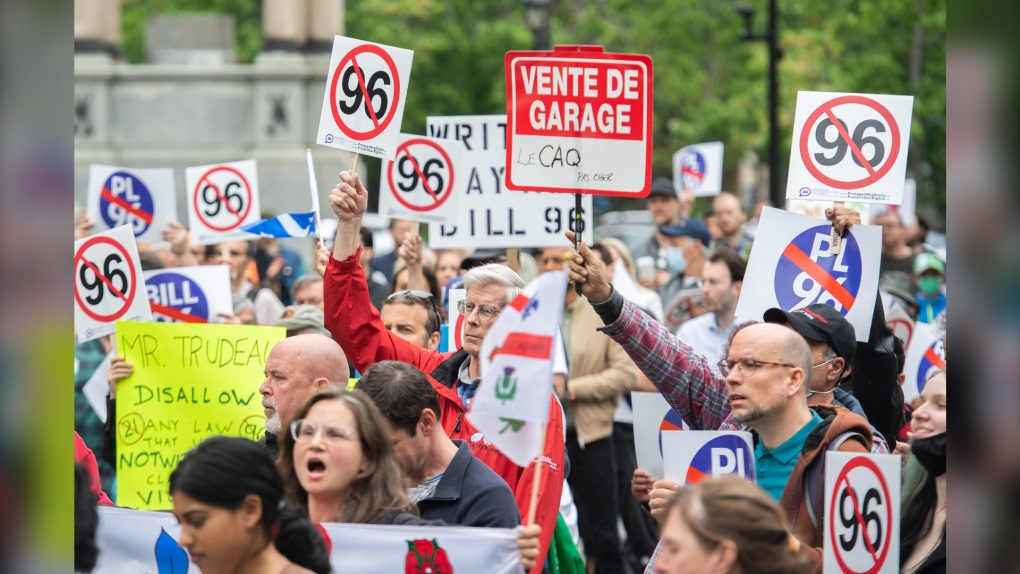 People take part in a protest against Bill 96 in Montreal on May 26, 2022. THE CANADIAN PRESS/Graham Hughes
People take part in a protest against Bill 96 in Montreal on May 26, 2022. THE CANADIAN PRESS/Graham Hughes
The summer of 2022 saw the passing of Bill 96, An act respecting French, the official and common language of Québec.
To say the bill is controversial would be an understatement, with particular opposition coming from Anglophone, Indigenous and business groups.
The bill, enacted through use of the notwithstanding clause, made French the Quebec government's exclusive language of communication, with some exceptions.
The goal is to promote the French language in Quebec, which statistics show is on the decline.
Applications of the law include stricter French requirements for businesses, restricted access to English-language colleges (CEGEPs) and language deadlines for immigrants.
The months since Bill 96's enactment have been a flurry of protests, court challenges, and article suspensions, with those in support of the law fighting back with equal fervour.
POPE'S VISIT
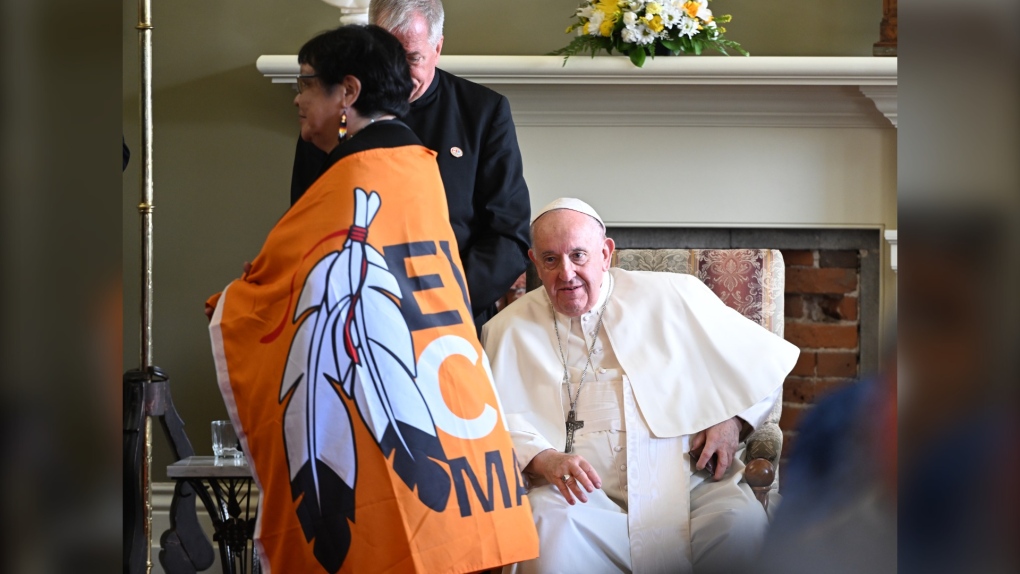 Pope Francis looks at a woman wearing a flag with the slogan Every Child Matters" on it at the end of a meeting with Indigenous people, during his papal visit across Canada in Quebec City on Friday, July 29, 2022. THE CANADIAN PRESS/Jacques Boissinot
Pope Francis looks at a woman wearing a flag with the slogan Every Child Matters" on it at the end of a meeting with Indigenous people, during his papal visit across Canada in Quebec City on Friday, July 29, 2022. THE CANADIAN PRESS/Jacques Boissinot
In July 2022, Pope Francis made a historic trip to Canada.
The Pope, whose visit included a three-day stop in Quebec City, had a core mission: to apologize for the Catholic Church's role in Canada's residential schooling system.
Whether said apology made a lasting difference remains to be seen; Pope Francis' "penitential visit" to Quebec was met with mixed reactions from Indigenous audiences, with some marking the event as an important step in reconciliation and others calling it lip service.
Although pope tours in Canada are few and far between, attendance at the Plains of Abraham was lower than expected.
The Pope's travels nevertheless highlighted the lasting hurt caused by residential schools, with survivors coming together to share their stories and demand reconciliatory action.
DEATH OF GUY LAFLEUR
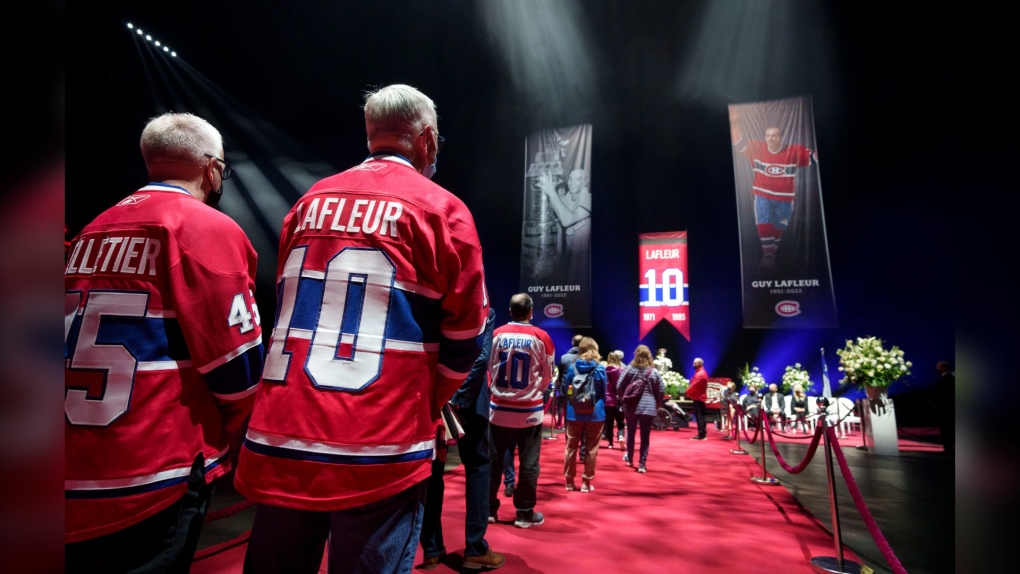 Fans line up to pay their respects to Guy Lafleur during visitation at the Bell Centre in Montreal on Monday, May 2, 2022. THE CANADIAN PRESS/Paul Chiasson
Fans line up to pay their respects to Guy Lafleur during visitation at the Bell Centre in Montreal on Monday, May 2, 2022. THE CANADIAN PRESS/Paul Chiasson
In April 2022, Montreal Canadiens legend Guy Lafleur died from lung cancer at age 70.
"The Flower" was the all-time scoring leader for the Habs and played 17 seasons in the NHL, winning five Stanley Cups.
His passing was met with an outpouring of grief from hockey enthusiasts around the world. A national funeral was held in his honour, attended by politicians (including Prime Minister Trudeau), hockey pros and hundreds of devoted fans.
A national funeral is a rare honour in Quebec, given to those who "made an impact on political life, as decided by the government," according to the province's definition.
COVID-19 CONTINUES
 People wear face masks as they talk on a street in Wednesday, February 2, 2022, as the COVID-19 pandemic continues in Canada. THE CANADIAN PRESS/Graham Hughes
People wear face masks as they talk on a street in Wednesday, February 2, 2022, as the COVID-19 pandemic continues in Canada. THE CANADIAN PRESS/Graham Hughes
Just as it did in 2020 and 2021, COVID-19 dominated the news in 2022.
Things got off to a rough start in Quebec, with a major spike in cases of the Omicron variant prompting the government to establish a controversial, temporary curfew running from 10 p.m. to 5 a.m.
In addition, back-to-school dates were postponed and non-essential commercial establishments were closed.
In February, the wave of "Freedom Convoy" protests had made its way to Quebec City, with demonstrators from across the province assembling to protest COVID-19 restrictions.
Cut to summer, and everything had changed; all restrictions were lifted, including mask mandates and vaccination passports, with political leaders promoting the adoption of a "new normal."
It's an attitude that made many health experts wary, especially as hospitals buckled beneath a cocktail of infections in the fall: COVID-19, influenza and respiratory syncytial virus.
Faced with this triple epidemic, Quebec health officials "strongly recommended" masking in public in November, but stopped short of making it mandatory.
SUNWING PLANE PARTY
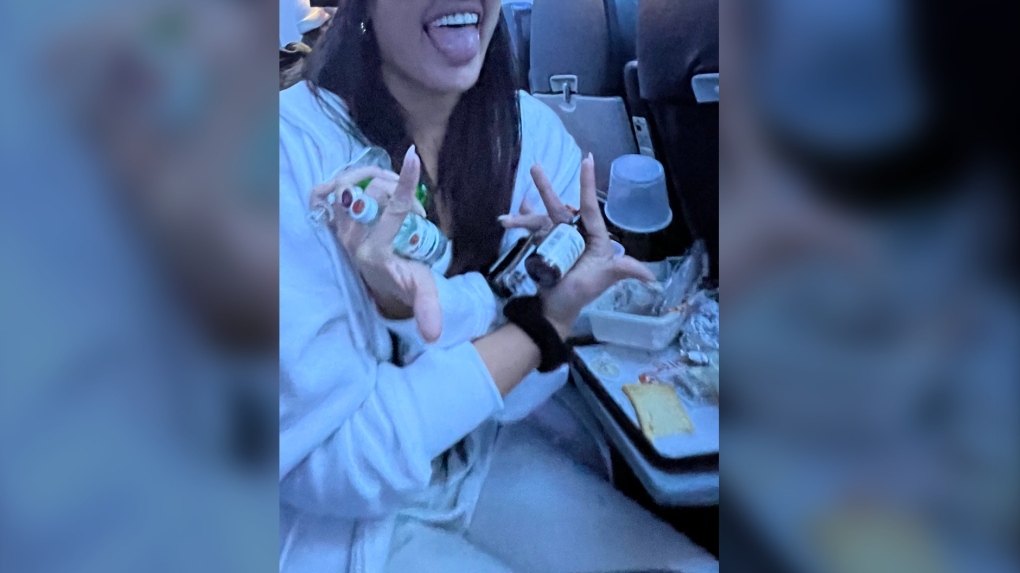 A still image from a video recorded on the Dec. 30, 2021 flight from Montreal to Cancun. (CTV file)It's a COVID-19 story that merits its own category: the Sunwing party scandal.
A still image from a video recorded on the Dec. 30, 2021 flight from Montreal to Cancun. (CTV file)It's a COVID-19 story that merits its own category: the Sunwing party scandal.
At the beginning of 2022, a group of Quebecers made international headlines after social media videos showed them partying maskless, vaping and drinking on a Sunwing flight to Cancun, Mexico.
The group was made up partly of Quebec social media influencers and reality TV stars, compounding the story's virality and even prompting a mention on Jimmy Fallon's The Tonight Show.
The incident touched a serious nerve with Quebecers and beyond as they grappled with a surge in cases of the COVID-19 Omicron variant and tightened pandemic restrictions.
Dozens of passengers involved have since been fined for breaking COVID-19 protocols.
MONKEYPOX
 A man receives a monkeypox vaccine at an outdoor walk-in clinic in Montreal, Saturday, July 23, 2022. THE CANADIAN PRESS/Graham Hughes
A man receives a monkeypox vaccine at an outdoor walk-in clinic in Montreal, Saturday, July 23, 2022. THE CANADIAN PRESS/Graham Hughes
2022 saw yet another virus make its way to Quebec: monkeypox. As of Dec. 23, 525 cases have been confirmed in the territory.
Montreal quickly became Canada's epicentre of the viral disease, which presents as a flu-like infection with a rash.
However, thanks to a rigorous vaccination campaign, infections were nearly eradicated across the city by November.
The campaign largely targeted men who have sex with other men, with an outdoor vaccination clinic set up in Montreal's Gay Village throughout part of the summer.
RISING VIOLENCE
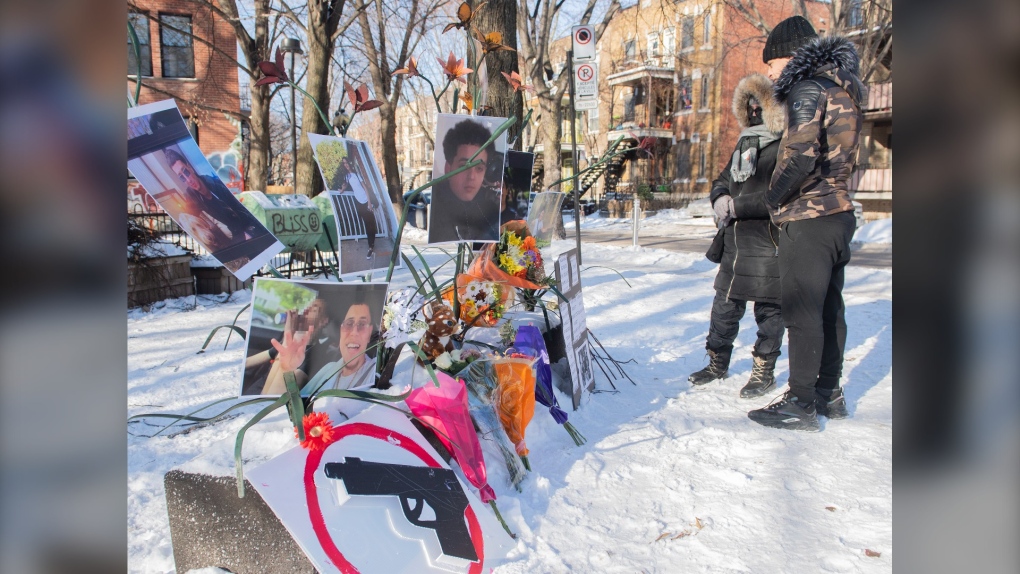 People look on next to a makeshift memorial for Amir Benayad and other victims of gun shootings following a vigil and demonstration against gun violence in Montreal, Sunday, January 16, 2022.
People look on next to a makeshift memorial for Amir Benayad and other victims of gun shootings following a vigil and demonstration against gun violence in Montreal, Sunday, January 16, 2022.
Although Montreal officials report a decreased rate of gun violence in 2022, the homicide rate went up.
Forty-one homicide deaths were reported in Montreal over the last year. In 2021, that number was 37. In 2020, it was 25.
Tragically, a handful of those deaths were teenagers. A string of violent teen deaths rocked Montreal in 2022, prompting calls for improved youth mental health and community services.
Quebec also saw multiple femicides over the year. Three of those femicides occurred back-to-back in the spring, leading experts to call for more drastic measures to reduce domestic violence.
Their pleas became all the more urgent in September when a man from Montreal's South Shore was accused of killing his spouse and two children.
Less than a month later, another man, this one from Laval, was also charged with murdering his two children.
The province had developed a specialized domestic violence court earlier in the year, and Montreal police established a specialized unit to tackle the issue.
PRIDE PARADE FLOP
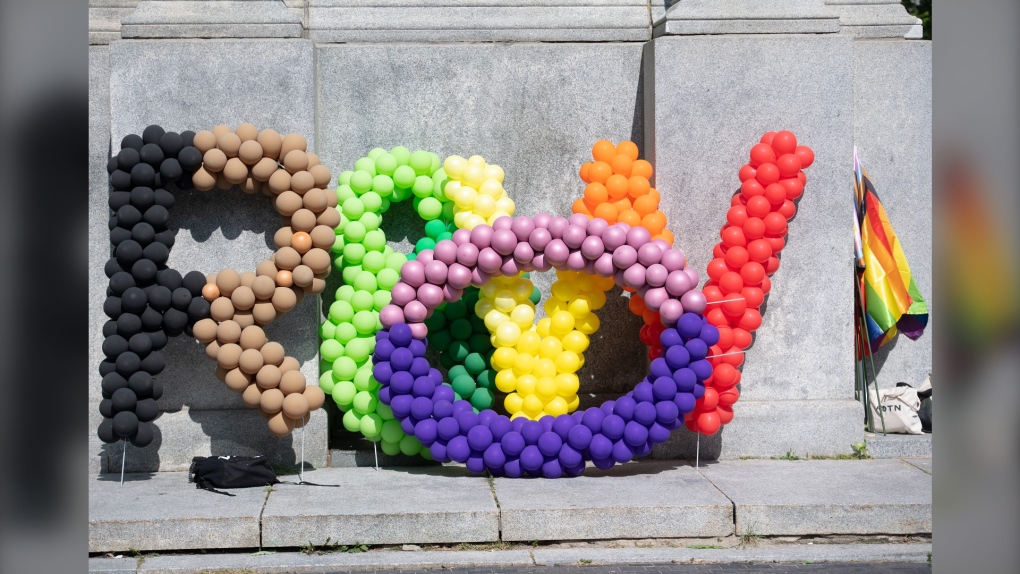 Rainbow flags and coloured balloons are shown at the site where the Montreal Pride parade was supposed to start from in Montreal, Sunday, August 7, 2022. Festival organizers cancelled the parade over concerns for security due to the lack of staff. THE CANADIAN PRESS/Graham Hughes
Rainbow flags and coloured balloons are shown at the site where the Montreal Pride parade was supposed to start from in Montreal, Sunday, August 7, 2022. Festival organizers cancelled the parade over concerns for security due to the lack of staff. THE CANADIAN PRESS/Graham Hughes
On the morning of Sunday, Aug. 17, 2022, thousands of Montrealers were readying for the annual pride parade, when they would take to the streets in celebration of the LGBTQ+ community.
But thousands of Montrealers would be gravely disappointed.
The Montreal Pride parade organizers cancelled the event just hours before it was set to start, citing a lack of personnel.
An investigation into the "fiasco," as Montreal Mayor Valerie Plante called it, would find organizers need to improve their communication methods, pay for security and hire more experienced staff.
The cancellation was a crushing blow for participants, especially given the parade's previous two-year COVID hiatus.
But that didn't stop Montreals from showing their pride, with makeshift celebrations popping up around the city.
COP-15
 Delegates arrive at the convention centre at the COP15 UN conference on biodiversity during a snowfall in Montreal, Friday, Dec. 16, 2022. (Paul Chiasson/The Canadian Press via AP, File)
Delegates arrive at the convention centre at the COP15 UN conference on biodiversity during a snowfall in Montreal, Friday, Dec. 16, 2022. (Paul Chiasson/The Canadian Press via AP, File)
2022 rounded off with a historic event in Montreal: COP15, the United Nations biodiversity summit.
The December summit brought delegates and leaders from around the world to Montreal's Palais des Congrès.
The main goal was to develop a global nature protection agreement -- a goal that proved difficult to achieve.
After nearly two weeks of negotiations, nations were hashing out the details until the last minute, with developing countries pushing for additional funding from developed ones.
Eventually, the agreement was reached, with nations agreeing to protect 30 per cent of earth's land and marine areas by 2030.
The event was also peppered with protests, with activists demanding more civilian decision-making powers and less emphasis on industry and government interests.
COP-15 involved Montreal's largest security operation in 20 years, with the Place d'Armes metro station blocked off to the public for the duration of the conference.
CTVNews.ca Top Stories

More than 115 cases of eye damage reported in Ontario after solar eclipse
More than 115 people who viewed the solar eclipse in Ontario earlier this month experienced eye damage after the event, according to eye doctors in the province.
B.C. seeks ban on public drug use, dialing back decriminalization
The B.C. NDP has asked the federal government to recriminalize public drug use, marking a major shift in the province's approach to addressing the deadly overdose crisis.
Last letters of pioneering climber who died on Everest reveal dark side of mountaineering
George Mallory is renowned for being one of the first British mountaineers to attempt to scale the dizzying heights of Mount Everest during the 1920s. Nearly a century later, newly digitized letters shed light on Mallory’s hopes and fears about ascending Everest.
Orca calf that was trapped in B.C. lagoon for weeks swims free
An orca whale calf that has been stranded in a B.C. lagoon for weeks after her pregnant mother died swam out on her own early Friday morning.
Sophie Gregoire Trudeau on navigating post-political life, co-parenting and freedom
Sophie Gregoire Trudeau says there is 'still so much love' between her and Prime Minister Justin Trudeau, as they navigate their post-separation relationship co-parenting their three children.
'I was scared': Ontario man's car repossessed after missing two repair loan payments
An Ontario man who took out a loan to pay for auto repairs said his car was repossessed after he missed two payments.
Powerful tornado tears across Nebraska, weather service warns of 'catastrophic' damage
Devastating tornadoes tore across parts of eastern Nebraska and northeast Texas Friday as a multi-day severe thunderstorm event ramped up in the central United States, injuring at least three people.
Toxic testing standoff: Family leaves house over air quality
A Sherwood Park family says their new house is uninhabitable. The McNaughton's say they were forced to leave the house after living there for only a week because contaminants inside made it difficult to breathe.
Trump's lawyers try to discredit testimony of prosecution's first witness in hush money trial
Donald Trump's defence team attacked the credibility Friday of the prosecution's first witness in his hush money case, seeking to discredit testimony detailing a scheme between Trump and a tabloid to bury negative stories to protect the Republican's 2016 presidential campaign.































